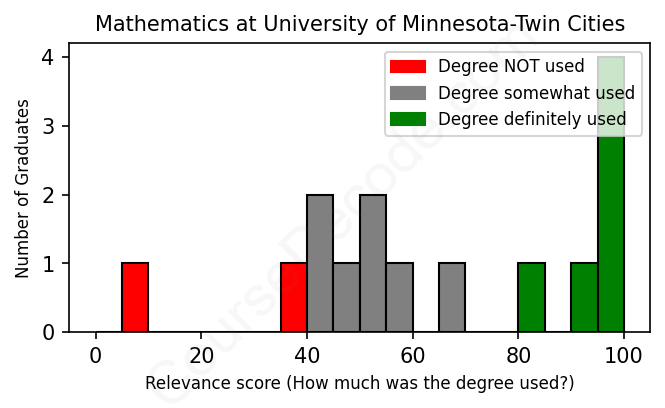
First, some facts. Of the Mathematics graduates from University of Minnesota-Twin Cities we've analyzed , here's how many have used (or NOT used) their degree in their career:

These are estimates based on AI analysis of 15 LinkedIn profiles (see below).
The verdict? Slightly below average. Overall, with an average relevance score of 65%, Mathematics graduates from University of Minnesota-Twin Cities have a slightly lower likelihood (-2%) of finding work in this field compared to the average graduate across all fields:
And for comparison, here's the chart for all profiles we've looked at across all degrees.
Also, after graduating, 40% of these graduates have pursued further education other than another Bachelor's degree (such as a Masters degree or other), compared to the average across all profiles of 35%. This suggests you may need more than just a Bachelors degree to be competitive as a Mathematics graduate.
See the details:
|
Relevance score: 100% We think this person has gone into a career highly relevant to their degree. We think this person has gone into a career highly relevant to their degree.
DEGREE INFOGraduated in 2011 from University of Minnesota-Twin Cities with a Bachelor of Science (B.S.) in Mathematics. Also pursued further education since (see below). JOB HISTORY SINCE GRADUATIONMath Teacher Math and Science Academy Aug 2013 - Dec 2014 Mathematics Instructor; Applied Algebra Course Lead  Augsburg University Jan 2015 - May 2017 Mathematics Instructor  Normandale Community College Jan 2015 - Present FURTHER DEGREES DONE SINCE GRADUATINGMaster's DegreeUniversity of Minnesota-Twin Cities 2011 - 2014 Master of Science (M.S.) University of Minnesota-Twin Cities 2011 - 2013 ABOUTExperienced Mathematics Teacher with an Education and Mathematics Master's Degree passionate about curriculum design and the latest pedagogical styles while motivating students to believe in themselves and establish a growth mindset that they can succeed in math. |
The top 10 most common jobs done by the graduates we've analyzed (ranked most common to least) are:
So, when looking at the career paths of people who graduated with a Mathematics degree from the University of Minnesota-Twin Cities, it’s clear that certain jobs pop up more often than others. A lot of graduates have found their way into roles like actuaries and data analysts. These positions are pretty much the gold standard for math majors because they rely heavily on mathematical principles, statistics, and analytical skills. For example, jobs like Actuarial Analyst and Senior Data Engineer involve lots of number-crunching and applying math concepts to solve real-world problems, which is exactly what a math degree prepares you for.
On the other hand, not every job listed is closely tied to mathematics. Some graduates ended up in roles like retail assistant or administrative positions where their math knowledge isn’t really utilized on a daily basis. While there are a few tech roles that incorporate some math—like Software Development Engineer—they tend to focus more on software and engineering principles rather than pure mathematics. Overall, it seems like many of the jobs align fairly well with their education, especially those in analytics and teaching, but there are definitely paths taken that don’t directly leverage a solid math foundation.
Here is a visual representation of the most common words in job titles for Mathematics graduates (this is across all Mathematics graduates we've analyzed, not just those who went to University of Minnesota-Twin Cities):

Graduates with a degree in Mathematics from the University of Minnesota-Twin Cities seem to follow a wide range of career paths, with many finding lucrative positions in fields related to data analysis, actuarial science, and education. For many, their first jobs post-graduation lean towards roles that harness their analytical skills, such as actuarial analyst positions or roles in research and technology, like at Medtronic or as a software developer. The data suggests a strong trend in the early careers of graduates gravitating toward positions that leverage their math skills, particularly in finance, healthcare, and education.
Looking further into their careers, around five to ten years after graduation, many alumni appear to advance significantly within their respective fields. Those in the finance and insurance sectors often migrate into senior actuarial roles or financial analytics positions, while others in tech transition into senior data roles or managerial positions in engineering. Educators often climb the ranks to become instructors or even professors, suggesting a commitment to leveraging their math education in academia. Overall, it seems that graduates from this program are finding solid, relevant careers that capitalize on their mathematical expertise, leading to a promising trajectory in their professional journeys.
Getting a Bachelor’s degree in Mathematics at the University of Minnesota-Twin Cities is definitely not a walk in the park, but it’s manageable if you’re willing to put in the effort. Math can be pretty challenging overall, and the coursework involves a lot of abstract concepts, proofs, and problem-solving that can really stretch your brain. It’s typically more intensive than some other majors because it builds on foundational skills and requires a strong grasp of logic and analytical thinking. If you enjoy math and are willing to dive deep into the material, it can be a rewarding experience, but if you find math tough, you might feel a bit overwhelmed at times. So, while the program is respected and tough, it’s not impossible—just be prepared to roll up your sleeves!
Most commonly, in the LinkedIn profiles we've looked at, it takes people 4 years to finish a Bachelor degree in Mathematics.
Looking at the career paths of these Math graduates from the University of Minnesota-Twin Cities, it seems like many of them have done pretty well financially, especially those in actuarial and tech roles. Jobs like Senior Actuary and Data Engineer are typically associated with good salaries, and we can see a clear upward trend in their careers. For example, the graduate who started as an Actuarial Analyst and moved up to Director likely makes a solid income now. On the other hand, while teaching positions, like those some of the graduates took on, can be rewarding in other ways, they don't usually offer the same financial perks. Overall, it looks like if you head into tech or finance with a math degree, you have a pretty good shot at making decent money.
Here is a visual representation of the most common words seen in the "about" section of LinkedIn profiles who have a Bachelor degree in Mathematics (this is across all Mathematics graduates we've analyzed, not just those who went to University of Minnesota-Twin Cities). This may or may not be useful:

Here are all colleges offering a Bachelor degree in Mathematics (ordered by the average relevance score of their Mathematics graduates, best to worst) where we have analyzed at least 10 of their graduates:
| College | Score | Count |
|---|---|---|
 University of Florida University of Florida
|
83 | 11 |
 Penn State University Penn State University
|
74 | 13 |
 The University of Texas at Austin The University of Texas at Austin
|
68 | 23 |
 University of Washington University of Washington
|
68 | 27 |
 University of California, Berkeley University of California, Berkeley
|
66 | 10 |
 University of Minnesota-Twin Cities University of Minnesota-Twin Cities
|
65 | 15 |
 California Polytechnic State University-San Luis Obispo California Polytechnic State University-San Luis Obispo
|
64 | 11 |
 University of North Texas University of North Texas
|
51 | 11 |
 University of California, Riverside University of California, Riverside
|
44 | 11 |